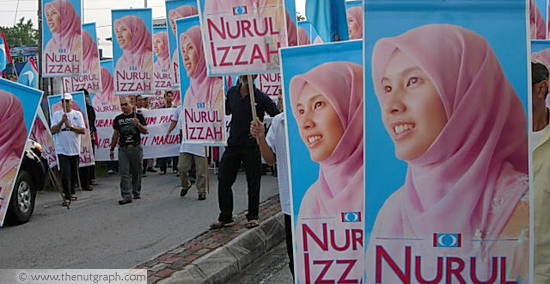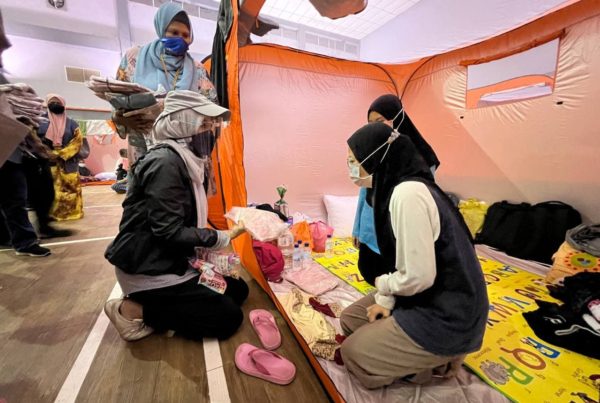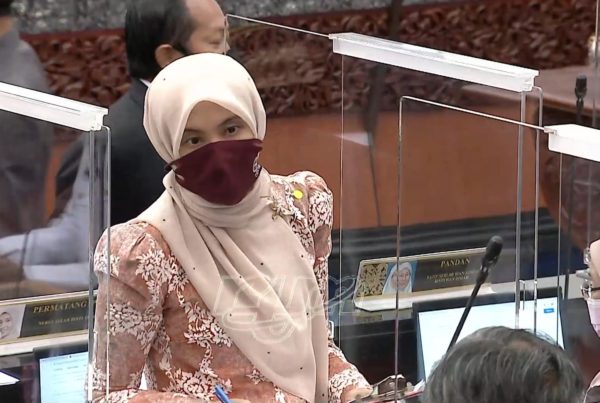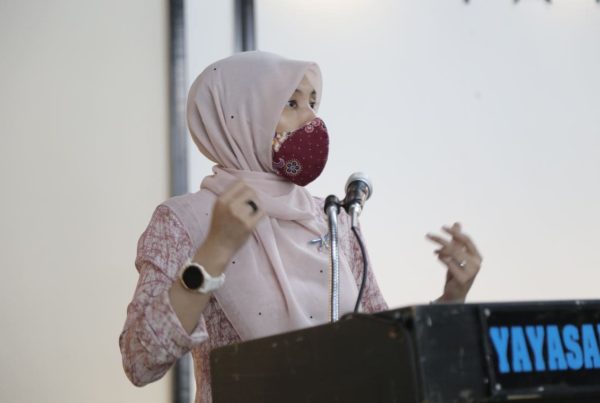
By Zedeck Siew
zedecksiew@thenutgraph.com
This article was first published in the Nut Graph [click h e r e] on the 21st May 2009.
DURING the March 2008 general election, election campaign posters for Parti Keadilan Rakyat (PKR) parliamentary candidate Nurul Izzah Anwar showed her smiling. Wreathed in a glowing aura, she seemed to be gazing into a bright Malaysian future.
Nurul Izzah campaign posters during nomination day, March 2008
Now the parliamentarian for Lembah Pantai, she is still seen as a poster-child for Pakatan Rakyat (PR)’s younger set of politicians. Her test — forging a distinct voice from under opposition leader and father Datuk Seri Anwar Ibrahim — is emblematic of the challenge her entire generation is facing.
The Nut Graph talks to Nurul Izzah about growing up as Anwar’s daughter, the pressing issues in Malaysia today, and what she thinks the country she has already inherited should be, going forward.
TNG: We are all pendatangs. Where do you come from?
NIA: My mother has some family members in Pasir Mas, Kelantan; the rest of her family is from Kedah. I think we’re quite diverse: my maternal great-grandfather had some Arab blood, and my great-grandmother had Korean ancestry, somehow — hence my Chinese-looking eyes.
But everyone in Malaysia is, somehow or another, like that.
My father is from Permatang Pauh: a place called Cheruk To’kun. He told us a lot of funny stories from his childhood, while he was in prison. One was quite vulgar — about this old man:
There was a dog running after him, so he ran up a coconut tree. He was wearing kain pelekat, and the kain pelekat fell, and all the kampung folk came to look at him. So the old man said — and my father’s storytelling abilities are better than mine — “Dunia punya luas, hangpa kena tengok sini buat ‘pa?”
Okay. It was really funny when he said it, right.
My father usually leads these childhood-story-telling times. He had a very vibrant childhood. Very well loved, very obedient. Anwar Ibrahim: everybody likes the old kid from the block.
TNG: How did your parents meet?
NIA: They were introduced by mutual friends. This was when she was doing her housemanship in General Hospital Kuala Lumpur.
When he was courting her it was quite controversial, because my grandfather was attached to the special branch. My father was, of course, Anwar Ibrahim, the soon-to-be-detained student activist, then. No father would have been happy with the fact that his daughter was going to be marrying this guy.
TNG: What was growing up like?
NIA: Most of my life, it was about being daughter of the Deputy Prime Minister, or the Finance Minister, or the Education Minister — those labels always came first. There was a lot of pressure. I definitely felt that I had to put on a certain character, to be at my best behaviour.
I remember my disciplinary teacher calling me up when I was 10. I had been running around on the first floor of the school block. She said: “You should be ashamed. You know who your father is.”
The fact that I grew up under my father’s influence helped me become a little bit more obedient, I guess…
I remember my secondary school classmates, after Form Five, asking for my help. They were rejected from local universities: there weren’t enough places, and all that. They sought my father’s help.
TNG: How did 1998 affect you?
NIA: Reformasi 1998 changed everything. Rule of law was transgressed, we didn’t have an independent judiciary. I already understood civil society-related issues, but I think all those events (in 1998) really made me understand the importance of safeguarding democratic institutions in the country.
And it helped me be really proud of my father’s achievements. At least he stood up for what’s right. He could have easily bought tickets for the whole family, to move overseas. Tun Dr Mahathir Mohamad offered that option.
TNG: What are your thoughts regarding Malaysian identity? Where do you think we are going?
NIA: We’re in a process of change, in terms of a national identity. I used to think that we were trapped in “mediocrity mode”. We championed it as something excellent — there was no real effort in ensuring our society continued to strive for excellence.
TNG: Mediocrity?
NIA: What I’m going to say will not be very popular, but this is what I went through.
I went to a private university for a while: Tenaga Nasional University (Uniten). In most of our classes it was a mix of races. They’d be Chinese (Malaysian) students and Malay (Malaysian) students. Sometimes I’d stay back with my Chinese (Malaysian) friends, and we’d be cramming for a particular course. I saw many Malay (Malaysian) students falling behind, and having to take diploma-rated courses, because of their bad results.
I think the relative ease in the way they get into university, the relative ease, in terms of passing marks, et cetera, contributed to this.
By the way, this is in my experience. I’m not saying this happens across the board.
To me, these things will not benefit Malay (Malaysians) in the long run. Because we’re losing out! My Chinese (Malaysian) friends worked so hard. You want to have that drive for everyone. I think that when you feel your space is getting smaller, in terms of access, then you’d probably be forced to strive for excellence.
It is ironic that this idea — that a race is going to lose out, and that the space for a particular race is shrinking because their rights are being taken away by all the other people that are closing in — is still being propagated by the powers that be. We have to get rid of this victimised mentality.
We always hear certain quarters clamour for the need of Malay Malaysians to stand up for ketuanan Melayu, or risk losing it.
Malays will always make up the majority of citizens in this country. Our birth rate — myself included (gestures to her pregnancy) — is the highest!
So why should we be fearful of the future? More the reason why we have to start relying on our soft skills: relying on our brains, our academic performance to excel. All this talk and fear-mongering tactics that race-based parties utilise are just nonsensical.
I try to bring issues like this up. It’s not easy, because it’s not popular.
When my father first criticised the New Economic Policy (NEP) in a Malaysiakini interview a few years ago, we were in disbelief. My husband and I went: “Did he just say that? Oh my God, we’re so dead (politically)!” We supported such criticism, of course — but it’s another thing, bringing it to the electorate. Of course we got attacked by racist groups; my father bore the brunt of it.
TNG: Is this knee-jerk reaction still around today?
NIA: There is more space for discourse than before. The 8 March (2008) general election has helped us to start something. Striving for excellence needs a paradigm shift. You need to start thinking, having discourse.
When you criticise the NEP, people don’t generally say “You’re doing something against (Malay Malaysians),” anymore. I think it’s slowly sinking in that this is not tenable.
Things are changing, despite Prime Minister Datuk Seri Najib Razak’s skewed 1Malaysia. Not necessarily everything Pakatan Rakyat has done is right. But at least the process has begun, and that’s how you begin to find out what’s good for, and what’s bad for you.
Right now, I remain optimistic. There is always hope for a better future.



